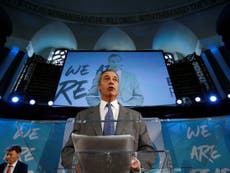Johnson goes full tilt for a general election, and leaves his opponents squabbling about constitutional law
If parliament is suspended, the Tory leader can talk about his plans for the NHS, education and his proposed tax cuts. All the while his opponents will be wondering how they can stop him

The Queen’s Speech on 14 October is not just a device to try to shut down opponents of a no-deal Brexit – it is also Boris Johnson’s chance to set out a programme for a general election after we have left the EU.
Next Wednesday Sajid Javid, the chancellor, will set out the government’s spending plans for the next year. Despite insisting he would stick to his predecessor’s fiscal rules, Javid is bound to declare austerity is over (again) and announce big spending on voter-sensitive headlines – the NHS, schools and police.
Assuming that Jeremy Corbyn fails to carry a vote of no confidence in Johnson’s government next week, the road will then be clear for a final Brexit showdown in the last two weeks of October.
No one can predict what will happen then, but if Johnson succeeds in taking Britain out of the EU, with or without a deal, he will have completed only the first level in his quest to be remembered as more than another failed stopgap prime minister.
He will still have a notional majority, with the Democratic Unionist Party on board, of one – and that is likely to have disappeared altogether by then if there are further Brexit-related defections from the Conservative Party.
So he has no prospect of governing effectively, even if parts of public opinion will be deeply grateful to him for breaking the Brexit deadlock, and even if larger parts of his own party carry him shoulder high through the streets as their conquering hero.
That is why he has to go for an election soon. The threat from the Brexit Party will have been parried, even if Nigel Farage tries to complain about the “wrong sort of Brexit”. And Labour will still struggle to fend off the Liberal Democrats, even if the immediate question of EU membership has been decided.
Hence the Queen’s Speech will be stuffed full of the measures relating to the NHS, schools and police numbers. It will be a big attempt to present the Johnson government as full of ideas for the whizzy technological economy of the future.
No doubt ministers will spend the weeks before the Queen’s Speech trumpeting Johnson’s programme, including the end of austerity, and how radically different it is from Theresa May’s.
By contrast, the opponents of a no-deal Brexit seem destined to spend that time banging on about constitutional procedure, which – if they fail to stop no-deal – will only strengthen Johnson’s position.
If the prime minister succeeds in taking the country out of the EU, his next big decision is not whether to go for a general election but when. If we have come out without a deal, there may be a case for a quick dash to the polls before the economic consequences of no-deal have hit hard. Alternatively, if there is likely to be short-term disruption followed by a period of calm before the longer-term negative effects feed through, there may be a case for an election in the spring of 2020.
Of course, the date of an election is no longer strictly in the prime minister’s hands, as it requires a two-thirds vote of the Commons. But, as in 2017, Corbyn would feel he had to ask Labour MPs to vote for an early election, having demanded one for so long.
One way or another, I suspect we are heading for a general election in the next few months.





Join our commenting forum
Join thought-provoking conversations, follow other Independent readers and see their replies